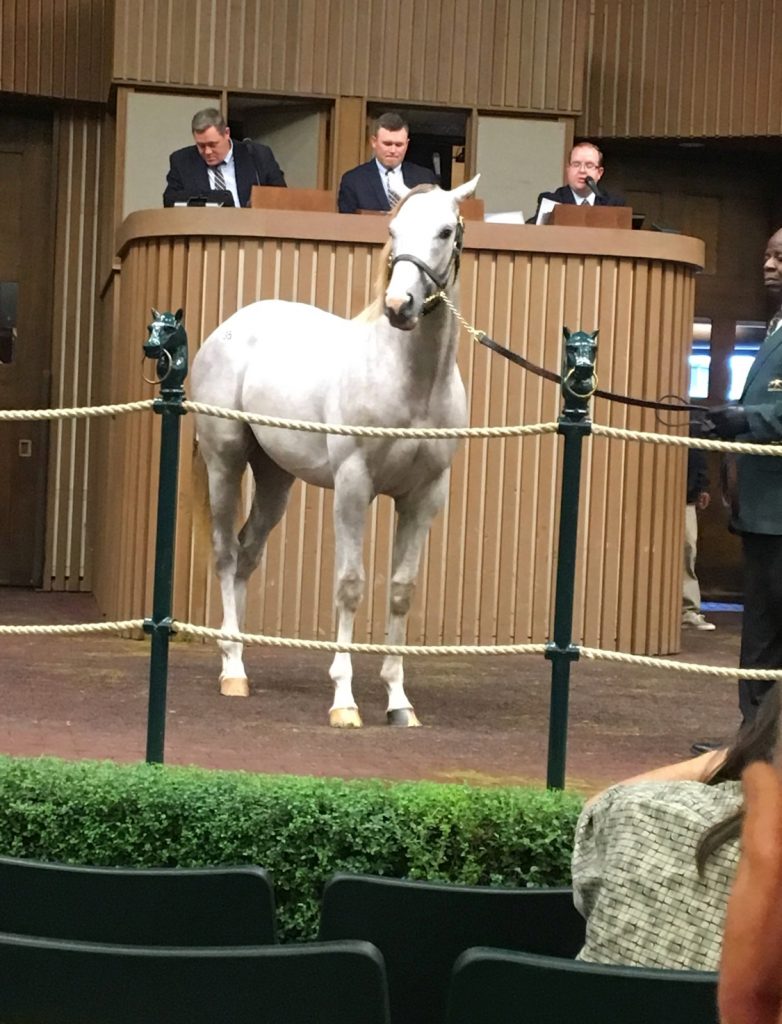
Amid Bone Strength Concerns, Sales Companies Announce Bisphosphonate Policies for Young Horses
by Nicolle Neulist
In light of rising concerns about the effects of off-label use of a group of drugs called bisphosphonates on bone development of young Thoroughbreds, leading sales companies Keeneland Association, Fasig-Tipton Company, Inc., and Ocala Breeders’ Sales company will allow buyers of horses younger than four years old to test their purchases for bisphosphonates, and will be able to rescind the sale should they find evidence of bisphosphonate use in the horse they purchased. These policies will go into effect on July 1, 2019.
A pair of drugs called bisphosphonates, tiludronate (Tildren) and clodronate (Osphos) were approved by the United States Food and Drug Administration (FDA) for the treatment of navicular syndrome, a degenerative condition of the navicular bone in a horse’s front hooves. Bisphosphonates have been approved to slow the degeneration of the navicular bone and relieve pain caused by navicular syndrome, similar to their use in humans who have the degenerative bone disease osteoporosis.
The FDA approved the use of bisphosphonates for navicular disease in older horses. However, concerns have been raised about how safe they are for younger horses. Concerns about their safety in younger racehorses are hardly new. have been raised by Dr. Larry Bramlage’s presentation at last year’s Rood and Riddle client education seminar, as well as by Dr. Jonathan McLellan of Florida Equine Veterinary Associates in a 2017 editorial in the Equine Veterinary Journal. Both veterinarians raise concerns that bisphosphonates can hinder the process of fully remodeling bone after microcracks that occur in bone as a result of the stresses and strains that occur during training.
In short, with bisphosphonates, the worry is things are not always what they seem: though that may make bones appear and horses feel less pain more quickly after a microcrack, it can prevent the bone from growing back as strong as it would have without the use of the drugs. Especially in horses who are young enough to be undergoing widespread bone development, it can make the horse more susceptible to broken bones later.
The British Horseracing Authority took action on bisphosphonate use in 2017. In Great Britain, no older horse who has received bisphosphonates can race within thirty days of receiving such a drug — and any horse given the drugs before the age of three years and six months, even for therapeutic reasons, is barred from racing under Rules for the rest of their life.
Though bisphosphonates are new ground for US sales rules, the way the rule functions Keeneland, Fasig-Tipton, and OBS already have similar policies in their conditions of sale related to anabolic androgenic steroids. Though there is no age range for the steroid test, otherwise the most recent published conditions of sale from all three companies reflect similar rights, responsibilities, and recourse with respect to steroids as they have stated their intent to implement with respect to bisphosphonates. Current conditions of sale allow buyers to check a box on the Acknowledgement of Purchase, and pay $500 to the sales company to cover testing costs. In the event of a positive steroid test, the buyer has twenty-four hours to notify the sales company that they elect to rescind the sale. If the buyer chooses to rescind the sale of a horse who tested positive, then the consignor must refund the sales proceeds, as well as pay “reasonable expenses” including the $500 fee for testing, as well as bills for veterinary service, vanning, and boarding.



